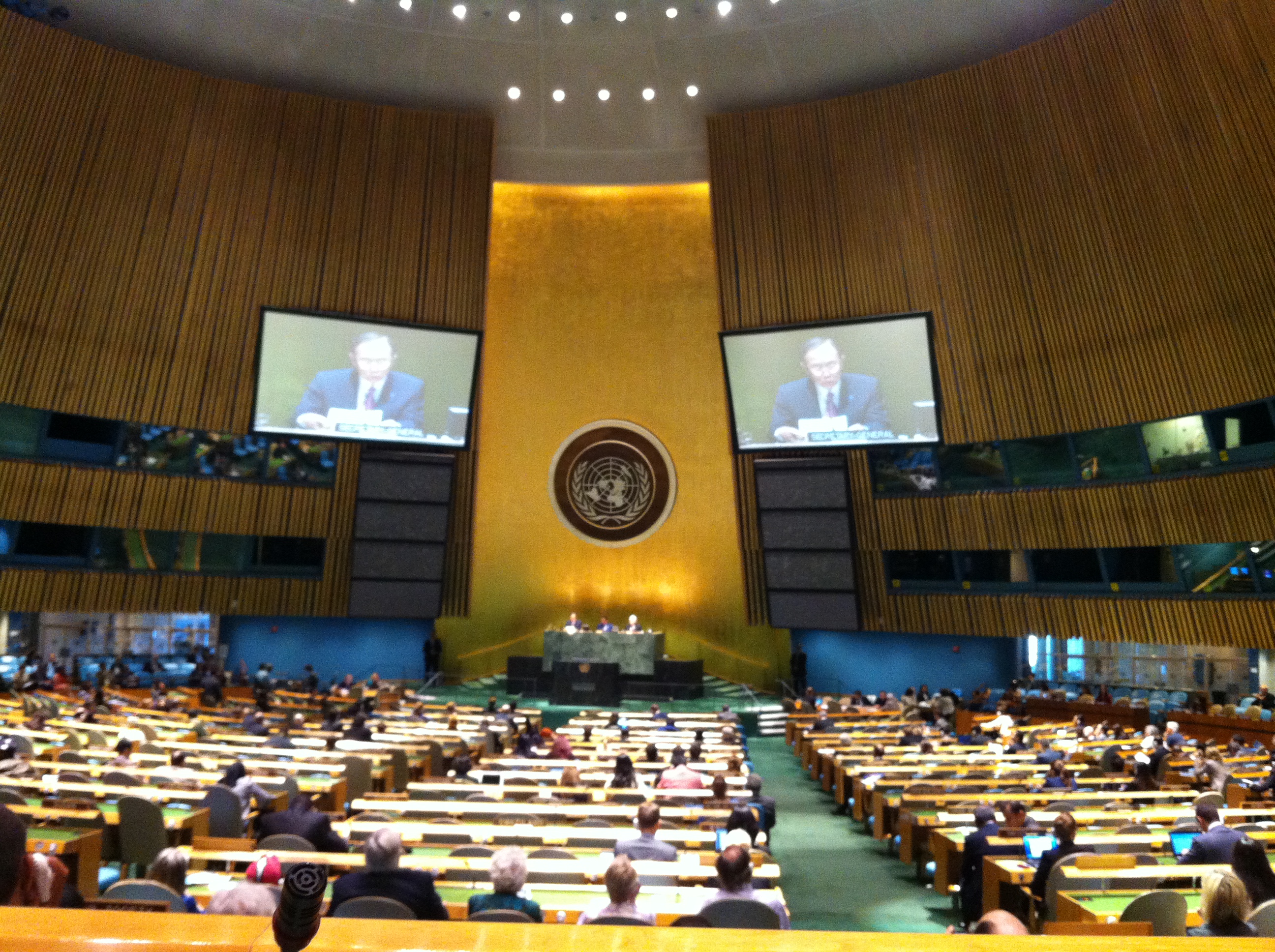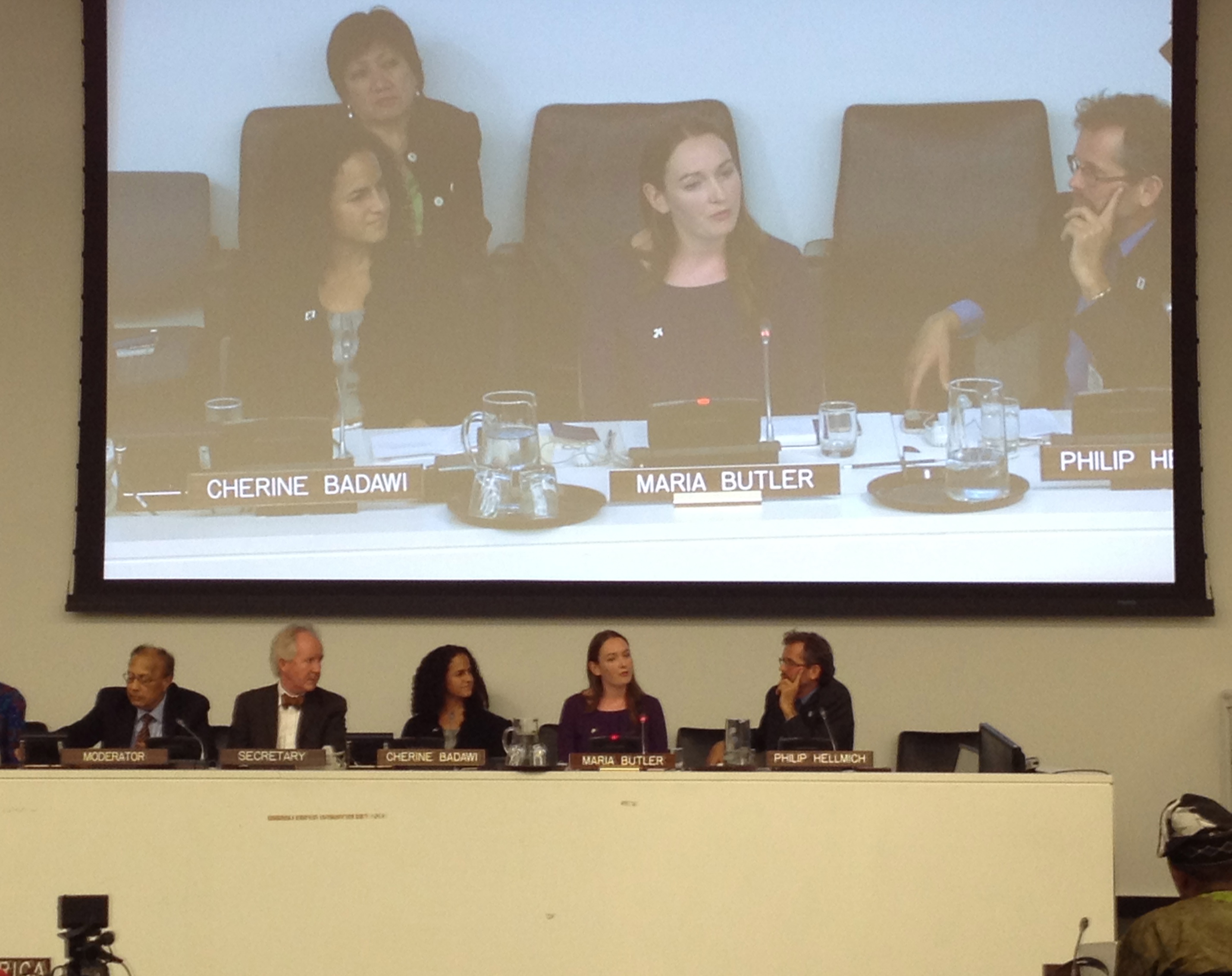High Level Forum on the "Culture of Peace"
Summary:
On September 14, 2012, the General Assembly hosted a High Level Forum on the Culture of Peace. The event was organized by the office of the President of the 66th UN General Assembly in cooperation with Foundation for Culture of Peace, Inter Press Service (IPS) and the Global Movement for the Culture of Peace (GMCoP). The objective of the forum was to advance the implementation of the United Nations Programme of Action on a Culture of Peace, by participating in discussions with representatives from the civil society and the academia.

The day included an opening session, two panel discussions and a concluding session. WILPF was represented by Maria Butler (PeaceWomen Director) on the second Panel. The remarks made throughout the day pointed to education, the advancement women's rights and youth engagement, as cornerstones for building a culture of peace.
When Secretary General of the United Nations Ban Ki-moon, opened the forum, he said that: “$1.7 trillion dollars was spent last year on weapons (…) Economists call this an ‘opportunity cost.' I call it a moral outrage”. And to illustrate his point on the need for investments in peace rather than in excessive military defense, he added that: “The world spends almost twice as much on weapons in one day than the United Nations spends for our global mission of peace, human rights and development in one year.”
In the opening session, both Mr. Abdulaziz Al-Nasser, President of the UN General Assembly and Ms. Cora Weiss, President of the Hague Appeal for Peace, stated that recognizing women as key agents in building peace and reconciliation is essential in order to create a culture of peace. Adding to that, Ms. Cora Weiss said that UN Security Council Resolution 1325 on Women, Peace and Security must be fully implemented to ensure the effectiveness of peace processes.
The opening session was then concluded by statements of the eight Permanent Missions that supported the event (Bangladesh, Benin, Costa Rica, El Salvador, Guatemala, Kazakhstan, Philippines and South Africa), of which many spoke of their nation's experiences of conflicts and the significance of a cultural change towards peace.
The first panel discussion was on “the Culture of Peace at the core of humanity's agenda: New partnerships, new development”. The panelists stressed that establishing partnerships between member states, civil society (particularly involving women, youth and marginalized groups), UN departments and academia, is indispensable for promoting a culture of peace and peace-building efforts worldwide. In addition, Lakshmi Puri, Assistant Secretary-General at UN Women, stated that: “gender equality and women's empowerment is critical to the realization of a culture of peace.” And to accomplish this, it must be widely recognized that “violence against women and girls remain one of our greatest threats to peace”, she said.

The topic of the second panel discussion was “strengthening the global movement, advancing the implementation of the UN Programme of Action on Culture of Peace: the way forward”. Maria Butler, director of PeaceWomen Project (WILPF), spoke of the importance of demilitarization and gender equality. She called for a stronger text of the Arms Trade Treaty (ATT), and emphasized that “arms must not be sold to countries perpetrating gender-based violence”. Furthermore, she said: “investing in nuclear weapons we do not need, is not investing in the culture of peace.” Maria Butler also emphasized the need of full implementation of UN Security Council Resolution 1325 to ensure women's participation in peace-building and the fulfillment of a culture of peace.
In the concluding session, Deputy Secretary-General Jan Eliasson, summarized the day's events. And yet again stressed its significance for promoting discussions and participations of actors and stakeholders from civil society to create a culture of peace.
Click here to watch the webcasts of the opening session, first panel, second panel and the closing session.
Background/Context:
The United Nations General Assembly resolution 53/243 on the Declaration and Programme of Action on a Culture of Peace, establishing the principles and foundations of the Culture of Peace, was adopted by consensus on 13 September 1999. Since then, the General Assembly through its subsequent annual substantive resolutions has highlighted the priority it attaches to
the full and effective implementation of this visionary decision which is universally applicable. In addition, the Assembly proclaimed the year 2000 as the “International Year for the Culture of Peace” (52/15) and declared the period 2001 to 2010 as the “International Decade for a Culture of Peace and Non-Violence for the Children of the World” (53/25).
Recognising the need for an additional boost to the global movement to promote the Culture of Peace, as envisaged by the United Nations, particularly in the current global context, this day-long, first-ever General Assembly High Level Forum is intended to be an open public opportunity for the UN member states, UN system entities, civil society including NGOs, media, private sector and all others interested to have an exchange of ideas and suggestions on the ways to build and promote the Culture of Peace. A special focus obviously will be on the implementation of the 1999 Programme of Action on Culture of Peace as well as for the further strengthening of the global movement that has been emerging, following the observance of the International Decade.
Relevant documentation:
ο UN General Assembly: Declaration and Programme of Action for a Culture Peace. A/RES/53/243. New York, 13 September 1999
ο UN General Assembly Resolutions: A/RES/51/101, A/RES/52/13, A/RES/52/15, A/RES/53/25, A/RES/55/377, A/RES/55/282, A/RES/56/5, A/RES/57/6, A/RES/58/11, A/RES/59/143, A/RES/60/3, A/RES/61/45, A/RES/62/89, A/RES/63/113, A/RES/64/80, A/RES/65/11 and A/66/116.
ο Foundation Culture of Peace: Good Practices on Culture of Peace. Barcelona, February 2007
ο Foundation Culture of Peace: World Report on the Culture of Peace 2010. Final Civil Society Report on the United Nations International Decade for a Culture of Peace and Non-violence for the Children of the World (2001-2010). Barcelona, September 2010
ο Foundation Culture of Peace: The development of Culture of Peace and Non-Violence (1988-2010). Report by Federico Mayor at the end of the United Nations International Decade on Culture of Peace and Non-Violence for the Children of the World (2001-2010). Barcelona, May 2011
